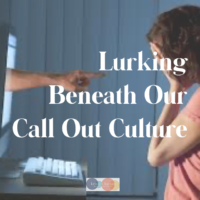
Over the last few days, I’ve watched an angry and growing mob lash out on social media against coaches and players on my son’s high school football team because of accusations against another player. That player nor the allegations are the subject of this blog post. In the same way, the teammates, coaches, and football parents (yes, even one of my Instagram photos is being attacks) should not be subject to the rage. However, the Twitter accounts of my son and his friends are blowing up from strangers bullying them for “allowing” someone like the accused on the team — as if my son and his friends, or coaches, had any prior knowledge of wrongdoing. Unfortunately, without the ability to delete such comments from their feeds, the world (including college recruiters and future employers) will be left to speculate, and maybe unjustly make presuppositions about the innocent.
Unrelated, and yet every bit related, recently on the Nextdoor App, an adult was called out by another adult for bad behavior. While I do not condone the action of the accused, everyone in town now knows what this person drives and where this person lives. Something else I don’t condone.
I wish I could say this is the first time I’ve seen such things happen, but sadly we’ve become a call out culture bent on publicly shaming anyone and everyone for all wrongdoings. And very quickly through social media, one person’s anger fuels the fire of others who jump on the bandwagon. Now there may be times and appropriate ways we join forces for justice, but for the purposes of this post, I want us to consider two underlying issues to what I see beneath our call out culture.
Self-justification
“Half the harm that is done in this world is due to people who want to feel important. They don’t mean to do harm—but the harm does not interest them. Or they do not see it, or they justify it because they are absorbed in the endless struggle to think well of themselves.”
T.S. Eliot
It is our human nature to long to feel our worth. The problem lies though in either not knowing, or resting, in the identity and worth bestowed upon us by God in Christ. And so, we turn to other things for our “enoughness,” the word author David Zahl uses in his book Seculosity (one of my favorites) to illustrate all the ways we seek to self-justify.
We can seek justfication from just about anything – parenting, volunteer work, social advocacy, time-managements skills, even our self-discipline, eating and exercise habits. Or, for our kids, they may seek their justification from their grades, talent, popularity or social media. In other words, we look to our good performance or appearance as the measure of our worth – our enoughness. But those things will never be enough, because a secure worth is not something we achieve but something Christ achieved for us. But, again not knowing or resting in his work and worth, we keep striving and — comparing.
We justify ourselves as okay in comparison to others we deem to be falling short, or at least worse off than us. To this end, when others fail to measure up to a certain standard, or do something we would never do, we feel more righteous. Therefore, when we call others out for their sin, or actually find joy in seeing others fall, I would argue that underneath is the need to feel okay about ourselves. To elevate ourselves. To self-justify.
Unbiblical Revenge
Recently I reread Dan Allender’s book Bold Love on the topics of forgiveness, restoration, and redemption. Something that struck me was the idea of revenge not being intrinsically evil, though that is how we (at least Christians) think of it. But if it is our human nature to also long for justice than revenge stems from the God-given desire for things to be made right. But as with seeking justification in the wrong places, revenge becomes unbiblical when we demand vengeance now– in our way and without any desire for restoration.
When we repay evil for evil, we circumvent God’s plan for vengeance and become a “hindrance to the work of redemption” as Allender says. And isn’t this exactly what is happening in our call out culture? What we fail to see in our rush to harass and condemn is our own evil. Our motivation is not to move the wrongdoer to repentance and delight in grace given to a sinner, rather, we seek to devour and kill, sadly delighting in the disgrace of others.
So, what do we do?
- We recongize our own sinful hearts and repent.
- We help our kids see the root beneath the need to call out others.
- We cast our eyes upon the One who calls us (sinners who seek the elevation of self and destruction of others) worthy!
For only when we see our own sin and face the reality of what we really deserve, but is withheld for no other reason other than the grace of God, will we become grace-givers. Calling out and condemnation will never change the culture. Only the absurity of undeserving grace given to sinners like us has the power to change the culture by transforming hearts.
